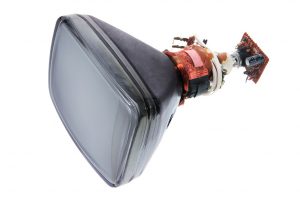
Credit: photosync/Shutterstock
For years, India-based electronics manufacturer Videocon has served as a major outlet for recovered CRT glass. But the company now says it is taking in only “limited” tonnages through its closest North American partner, and former suppliers contend that Videocon has ceased production of new CRT devices altogether.
Videocon has long received much of its material from the U.S. through a company called Technologies Displays Mexicana (TDM), which has worked alongside partners Cali Resources and Glassico.
Separating and cleaning the material at its plant in Mexicali, Mexico, TDM has shipped hundreds of millions of pounds of glass directly to Videocon, which has historically processed the material at a site in Bharuch, India to manufacture new CRTs. While much of the rest of the world has transitioned to flat-panel TVs and monitors, Videocon representatives have said that CRTs have continued to see modest demand in India and other developing markets.
In an email to E-Scrap News, Videocon’s Albino Bessa acknowledged that tonnages shipped from TDM to Videocon are currently “limited.” He would not say whether the firm is receiving material from any other North American company.
Bessa also would not elaborate on the specifics of the company’s CRT demand or its handling of material. Industry members who have worked with Videocon in the past, however, say Videocon is reducing its consumption because its glass-to-glass operation is no longer running.
Signals started several years ago
Videocon’s status as an end user of CRT material has become a key question amid tightening CRT markets. The recent suspension of CRT glass exports to the Netherlands and the 2017 closure of Nulife Glass are just two of the more recent examples of difficulties in the CRT recycling landscape.
And Videocon itself has been the subject of uncertainty for some time. In October 2015, E-Scrap News reported on Videocon shutting down its CRT processing furnaces due to a variety of maintenance issues. After reopening for a brief period of time in 2016, the operation faced another shutdown in August 2016.
URT, a Wisconsin-based e-scrap processor that formerly worked with brokers to route material to Videocon, stopped doing so in early 2015, according to a company executive.
Jeff Gloyd, vice president of marketing and sales at URT, told E-Scrap News there were “maintenance issues [and] significant downtimes” at the plant in Bharuch even before the operation had to go off-line in 2015. Those issues corresponded with a move away from CRT manufacturing, Gloyd noted.
“They were no longer turning the glass into a new CRT tube and they didn’t need the volume they previously needed,” Gloyd said.
According to Gloyd, URT was told by partners working directly with Videocon that the firm began operating “a more traditional lead smelter operation where they might want some volume of CRT glass for whatever purpose, but weren’t then turning it into another CRT tube.”
TT Srinivasan, the owner of New York-based brokerage firm Samca International, told E-Scrap News his company stopped working with Videocon for the same reasons.
He noted Videocon is now “working on a new project … so they can use the CRT glass.” He declined to provide additional details on the initiative or current glass capacity.
ERI, one of the country’s largest e-scrap processors, has also stopped supplying Videocon. Aaron Blum, ERI’s chief operating officer and chief compliance officer, said his company hasn’t sent material to the Indian firm for almost two years due to a lack of demand.
Videocon’s website no longer lists CRTs in its lineup of TVs.
While in the past Videocon and its North American partners have openly discussed its glass-to-glass operation, Videocon’s Bessa would not disclose how the company is currently handling any CRT material it may be receiving.
“All processing info is confidential,” he noted in his email to E-Scrap News.
Regulators weigh in as TDM explores other options
With Videocon’s appetite for glass falling, companies and programs that currently route CRT material through Cali Resources, Glassico and TDM will likely need answers about how exactly those tonnages are handled.
Mark Latham, the manager of Connecticut’s state electronics recycling program, said that documentation submitted by recyclers to the state indicates that TDM is routing the material to Videocon for glass-to-glass manufacturing.
“It is my understanding that the total weight of glass from Connecticut that goes to TDM is, indeed, being sent to Videocon on a mass balance basis … with an expectation that Videocon uses the glass cullet to make new CRT glass in its glass-to-glass operation,” Latham stated.
In California, meanwhile, Anna-Maria Stoian-Chu of the California Department of Resources Recycling and Recovery (CalRecycle) said no companies that are part of the state program there have used TDM or Videocon since October 2016. But she added the agency continues to work under the assumption that Videocon is manufacturing CRTs with recycled CRT glass.
“CalRecycle has not received any kind of information that Videocon has permanently moved away from … glass manufacturing and stopped making new CRTs,” she told E-Scrap News.
In a July 2017 email to state officials in California, Carlos Kelvin, the president of Cali Resources, suggested the firm’s once robust relationship with Videocon had run into significant limitations.
“TDM still ha[s] some ability to ship to Videocon for CRT recycling,” Kelvin wrote in the email, which was obtained by E-Scrap News. “However, the amounts are limited and the availability is uncertain.”
Kelvin also made it clear in his email that Cali Resources, Glassico and TDM were no longer reliant on Videocon as a downstream for CRT glass. Kelvin said the companies have “a range of recycling options available to us, including Camacho’s tiles, smelters, and the manufacture of concrete blocks,” according to the email.
Camacho Recycling is a Spanish firm that supplies European tile manufacturers with recycled CRT glass for use in their products. J.J. Santos, Camacho’s international manager of waste electrical and electronic equipment, said his company did not receive any material from TDM in 2017, however.
Meanwhile, Bessa told E-Scrap News in his email that Videocon’s North American partners “had always been looking for alternatives and sustainable downstreams for glass in order to absorb all volumes of [their] clean glass cullet.”
“Glassico [and] TDM will continue to process and send to downstream customers that can use CRT glass in their process,” Bessa stated.



